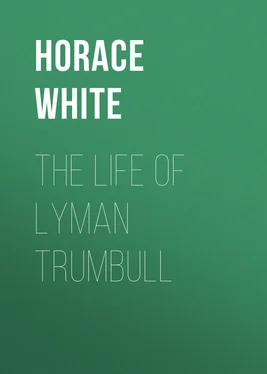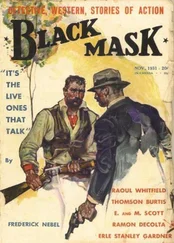Horace White - The Life of Lyman Trumbull
Здесь есть возможность читать онлайн «Horace White - The Life of Lyman Trumbull» — ознакомительный отрывок электронной книги совершенно бесплатно, а после прочтения отрывка купить полную версию. В некоторых случаях можно слушать аудио, скачать через торрент в формате fb2 и присутствует краткое содержание. Жанр: foreign_prose, История, foreign_edu, foreign_antique, на английском языке. Описание произведения, (предисловие) а так же отзывы посетителей доступны на портале библиотеки ЛибКат.
- Название:The Life of Lyman Trumbull
- Автор:
- Жанр:
- Год:неизвестен
- ISBN:нет данных
- Рейтинг книги:5 / 5. Голосов: 1
-
Избранное:Добавить в избранное
- Отзывы:
-
Ваша оценка:
- 100
- 1
- 2
- 3
- 4
- 5
The Life of Lyman Trumbull: краткое содержание, описание и аннотация
Предлагаем к чтению аннотацию, описание, краткое содержание или предисловие (зависит от того, что написал сам автор книги «The Life of Lyman Trumbull»). Если вы не нашли необходимую информацию о книге — напишите в комментариях, мы постараемся отыскать её.
The Life of Lyman Trumbull — читать онлайн ознакомительный отрывок
Ниже представлен текст книги, разбитый по страницам. Система сохранения места последней прочитанной страницы, позволяет с удобством читать онлайн бесплатно книгу «The Life of Lyman Trumbull», без необходимости каждый раз заново искать на чём Вы остановились. Поставьте закладку, и сможете в любой момент перейти на страницу, на которой закончили чтение.
Интервал:
Закладка:
The slaveholders were alarmed by this new movement at the North. They thought that it aimed to incite slave insurrection. The governor of South Carolina made it the subject of a special message. The legislature of Georgia passed and the governor signed resolutions offering a reward of $5000 to anybody who would bring Mr. Garrison to that state to be tried for sedition. The mayor of Boston was urged by prominent men in the South to suppress the Liberator , although the paper was then so obscure at home that the mayor had never seen a copy of it, or even heard of its existence. The fact that there was any organized expression of anti-slavery thought anywhere was first made generally known at the North by the extreme irritation of the South; and when the temper of the latter became known, the vast majority of Northern people sided with their Southern brethren. They were opposed to anything which seemed likely to lead to slave insurrection or to a disruption of the Union. The abolitionist agitation seemed to be a provocation to both. Hence arose anger and mob violence against the abolitionists everywhere. This feeling took the shape of a common understanding not to countenance any discussion of the slavery question in any manner or anywhere. The execution of this tacit agreement fell for the most part into the hands of the disorderly element of society, but disapproval of the Garrisonian crusade was expressed by men of the highest character in the New England States, such as William Ellery Channing and Dr. Francis Wayland. The latter declined to receive the Liberator , when it was sent to him gratuitously.
What was going on in the South during the thirties and forties of the last century? There were varying shades of opinion and mixed motives and fluctuating political currents. In the first place cotton-growing had been made profitable by the invention of the cotton-gin. This machine for separating the seeds from the fibre of the cotton plant caused an industrial revolution in the world, and its moral consequences were no less sweeping. It changed the slaveholder's point of view of the whole slavery question. The previously prevailing idea that slavery was morally wrong, and an evil to both master and slave, gradually gave way to the belief that it was beneficial to both, that it was an agency of civilization and a means of bringing the blessings of Christianity to the benighted African. This change of sentiment in the South, which became very marked in the early thirties, has been ascribed to the bad language of the abolitionists of the North. People said that the prime cause of the trouble was that Garrison and his followers did not speak easy. They were too vociferous. They used language calculated to make Southerners angry and to stir up slave insurrection. But how could anybody draw the line between different tones of voice and different forms of expression? Thomas Jefferson was not a speak-easy. He said that one hour of slavery was fraught with more misery than ages of that which led us to take up arms against Great Britain. If Garrison ever said anything more calculated to incite slaves to insurrection than that, I cannot recall it. On the other hand, Elijah Lovejoy, at Alton, Illinois, was a speak-easy. He did not use any violent language, but he was put to death by a mob for making preparations to publish a newspaper in which slavery should be discussed in a reasonable manner, if there was such a manner.
Nevertheless, the Garrisonian movement was erroneously interpreted at the South as an attempt to incite slave insurrection with the attendant horrors of rapine and bloodshed. There were no John Browns then, and Garrison himself was a non-resistant, but since insurrection was a possible consequence of agitation, the Southern people demanded that the agitation should be put down by force. As that could not be done in any lawful way, and since unlawful means were ineffective, they considered themselves under a constant threat of social upheaval and destruction. The repeated declaration of Northern statesmen that there never would be any outside interference with slavery in the states where it existed, did not have any quieting effect upon them. The fight over the Missouri Compromise had convinced them that the North would prevent, if possible, the extension of slavery to the new territories, and that this meant confining the institution to a given space, where it would be eventually smothered. It might last a long time in its then boundaries, but it would finally reach a limit where its existence would depend upon the forbearance of its enemies. Then the question which perplexed Thomas Jefferson would come up afresh: "What shall be done with the blacks?" Mr. Garrott Brown, of Alabama, a present-day writer of ability and candor, thinks that the underlying question in the minds of the Southern people in the forties and fifties of the last century was not chiefly slavery, but the presence of Africans in large numbers, whether bond or free. This included the slavery question as a dollar-and-cent proposition and something more. Mrs. Fanny Kemble Butler, who lived on a Georgia plantation in the thirties, said that the chief obstacle to emancipation was the fact that every able-bodied negro could be sold for a thousand dollars in the Charleston market. Both fear and cupidity were actively at work in the Southern mind.
In short, there was already an irrepressible conflict in our land, although nobody had yet used those words. There was a fixed opinion in the North that slavery was an evil which ought not to be extended and enlarged; that the same reasons existed for curtailing it as for stopping the African slave trade. There was a growing opinion in the South that such extension was a vital necessity and that the South in contending for it was contending for existence. The prevailing thought in that quarter was that the Southern people were on the defensive, that they were resisting aggression. In this feeling they were sincere and they gave expression to it in very hot temper.
General W. T. Sherman, who was at the head of an institution of learning for boys in Louisiana in 1859, felt that he was treading on underground fires. In December of that year he wrote to Thomas Ewing, Jr.:
Negroes in the great numbers that exist here must of necessity be slaves. Theoretical notions of humanity and religion cannot shake the commercial fact that their labor is of great value and cannot be dispensed with. Still, of course, I wish it never had existed, for it does make mischief. No power on earth can restrain opinion elsewhere and these opinions expressed beget a vindictive feeling. The mere dread of revolt, sedition, or external interference makes men, ordinarily calm, almost mad. I, of course, do not debate the question, and moderate as my views are, I feel that I am suspected, and if I do not actually join in the praises of slavery I may be denounced as an abolitionist. 6 6 General W. T. Sherman as College President , p. 88.
CHAPTER I
ANCESTRY AND EARLY LIFE
The subject of this memoir was born in Colchester, Connecticut, October 12, 1813. The Trumbull family was the most illustrious in the state, embracing three governors and other distinguished men. All were descendants of John Trumbull (or rather "Trumble" 7 7 Stuart's Life of Jonathan Trumbull says that the family name was spelled "Trumble" until 1766, when the second syllable was changed to "bull."
), a cooper by trade, and his wife, Ellenor Chandler, of Newcastle, England, who migrated to Massachusetts in 1639, and settled first in Roxbury and removed to Rowley in the following year. Two sons were born to them in Newcastle-on-Tyne: Beriah, 1637 (died in infancy), and John, 1639.
The latter at the age of thirty-one removed to Suffield, Connecticut. He married and had four sons: John, Joseph, Ammi, and Benoni.
Читать дальшеИнтервал:
Закладка:
Похожие книги на «The Life of Lyman Trumbull»
Представляем Вашему вниманию похожие книги на «The Life of Lyman Trumbull» списком для выбора. Мы отобрали схожую по названию и смыслу литературу в надежде предоставить читателям больше вариантов отыскать новые, интересные, ещё непрочитанные произведения.
Обсуждение, отзывы о книге «The Life of Lyman Trumbull» и просто собственные мнения читателей. Оставьте ваши комментарии, напишите, что Вы думаете о произведении, его смысле или главных героях. Укажите что конкретно понравилось, а что нет, и почему Вы так считаете.












